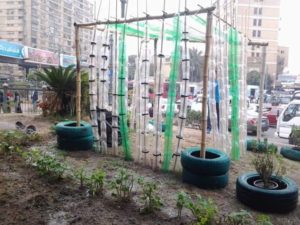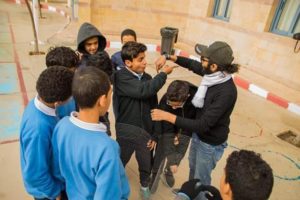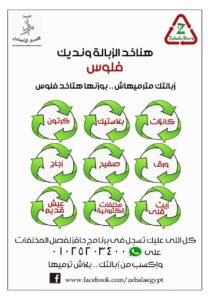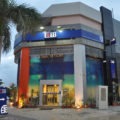“What started as an awareness project became an integral part of our NGO’s business model. Donations fluctuate and sometimes disappear completely; they’re unreliable. The Zebala Store project, however, allows us to fund our activities through the recycling of people’s garbage. It’s hard for people to resist giving away their garbage from the comfort of their homes in return for money.”
And from the comfort of my own home, I stumbled upon a Facebook page titled Zebala Store with 50,000+ likes. Shortly after I sent them a message asking to learn more about who they are, they put me in touch with Emad Anwar, the CEO of Adam Foundation – the NGO behind it. I met with Anwar to talk about the evolution of his work life as a marketer, the mechanisms behind Zebala Store, and where he sees it headed in the future.
Simply put, the Zebala Store transparently depends on the stock prices to decide how much money they’ll give you in return for the different recyclable items in your garbage. Their Facebook page continually posts about what you could give them — and it’s not just plastic and paper — they’ll also take away any cigarette butts you might have and all the used cooking oil your kitchen produces.

Eman Anwar during one of Zebala Store’s events — Via Zebala Store
What started as a physical space in El Omraneyah, quickly transformed to a virtual store. All you need to do to sell them your garbage is send a WhatsApp text with your address and they will show up at your doorstep. You get your share and the rest of the money they make from recycling is used as funding for the charitable activities of the Adam Foundation.
“But of course it’s not as easy as it sounds. It’s difficult to find committed volunteers and even the drivers we pay to help us collect the garbage disappear without a notice or give ridiculous excuses,” he laughed as he recalled a driver who excused himself because he “now had enough money to buy the drugs he had aimed to get from the start.”

Some of Zebala Store’s creations — Via Zebala Store
A noteworthy feature of the Zebala Store page is that all the captions have one thing in common: they’re written in Arabic and address females. It seemed odd to me that a page whose audience could be anyone who produces recyclable garbage would risk alienating almost half of the Egyptian population. But the reasons behind this direction reflects some of Anwar’s core beliefs and assumptions.
“At first we wrote in English, but we shifted to writing in Arabic to make the page accessible to more segments of the population,” he elaborated. “And if we want to make recycling part of our culture, we have to speak to and engage younger generations and families. In the Egyptian home, mothers possess the power to do that, and hence our captions address females.”

Emad Anwar and students coming together to collect garbage — Via Zebala Store
And this was most notably reflected in the Zebala Festival; an on-ground activation dedicated to engaging children in recycling and instilling in them the importance of garbage. The only way to participate was to bring along a specified minimum of recyclable items. “A lot of people tried to persuade me to use another synonym for Zebala in the name before the festival, but this is the word we use in our daily lives and the shocking name ended up getting us a lot of attention,” said Anwar as he recalled naming the festival that helped kick off the Zebala store.
Anwar graduated from the Arab Academy for Science and Technology with a Bachelor’s degree in marketing and continued to finish a Master’s degree titled ‘How to give Money Without Money’. He then started his own marketing agency, Blue Shadow, which specializes in CSR (Corporate Social Responsibility) and awareness campaigns. He firmly believes that what we can all agree upon is that a polluted environment is bad for our health, and utilizes all his marketing knowledge and skills to make recycling an indispensable part of our lives.

A graph created by Emad Anwar to explain how his business operates — Via Zebala Store
When he tried to kick off his work on recycling as the CEO of his marketing agency he faced numerous regulatory restrictions. It then became clear to him that doing it through an NGO that cooperates with relevant governmental bodies like the Egyptian Environmental Affairs Agency would make things a lot easier. And so Blue Shadow gave birth to Adam and Adam created one of the strongest recycling initiatives in the country and an innovative fundraising technique.
In the future, Anwar aims to turn the Zebala Store into a franchise so its physical shops can easily spread across the country. In the upcoming month, he will organize building the longest Christmas tree out of recyclable garbage. Even though he realizes the gravity and urgency of the situation, his fire is fueled by a light he perceives at the end of a very long tunnel. “We don’t have the infrastructure or the necessary elements for systemic recycling in Egypt yet, and it’s not a part of our culture. So we’re going to need all the help we can get to make it happen.”




























